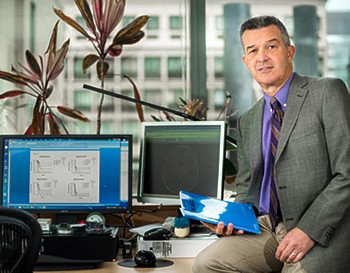New Approaches from the Lab to the Clinic
The arsenal for immunotherapy – cancer treatments designed to fortify the ability of the body’s natural defense system to attack a tumor – is rapidly expanding, and researchers at the Center for Neuro-Oncology are leading the evaluation of many of these exciting approaches from the research laboratory to the clinic for brain cancer patients. The spectrum of these promising therapies includes innovative vaccines, immune checkpoint agents, and genetically engineered viruses.
Each of these approaches is designed to tap into the potential of a different aspect of our immune system to provide an advantage against the tumor. Importantly, our researchers are moving forward with next-generation clinical trials that are combining these potentially synergistic approaches – to provide an even greater opportunity for the immune system to attack brain tumors.

For example, in a collaboration with Catherine Wu, MD, Chief of Stem Cell Transplantation and Cellular Therapies at Dana-Farber, David Reardon, MD, and colleagues at the Center for Neuro-oncology are launching the second trial of a personalized neoantigen vaccine for glioblastoma patients. This trial will combine the vaccine with an anti-PD-1 immune checkpoint inhibitor. In the first trial, which was published in late 2018, Reardon and colleagues demonstrated that this individualized vaccine approach successfully generated robust anti-tumor immune responses that migrated into the tumor in the brain, an accomplishment that had never been documented in the history of immunotherapy for brain cancer. The combination approach being evaluated in the next neoantigen trial hopes to further push a successful attack of the immune system against glioblastoma tumors.
Patrick Wen, MD, and Reardon are also evaluating combination approaches with immunomodulatory agents for glioblastoma patients which are designed to break down protective mechanisms that tumors exploit to evade the immune system. In addition, in a recently published trial they found that the administration of PD1 antibodies to recurrent glioblastoma patients before surgery increased the antitumor immune response and appeared to improve survival. A follow-up study to confirm and build on these results is being planned. Eudocia Lee, MD, MPH, and Ugonma Chukwueke, MD, are leading clinical trials to evaluate such approaches for patients with tumors that have metastasized to the brain, while Lakshmi Nayak, MD, is leading efforts to evaluate these agents for patients with lymphomas and other blood-borne cancers that involve the brain.
Another exciting immunotherapy focus for the Center for Neuro-Oncology is the use of genetically engineered viruses which, when injected into the tumor, can initiate a direct attack against the tumor that also potently stimulates the immune system to join the attack. In collaboration with Ennio Chiocca, MD, PhD, Chair of Neurosurgery at Brigham and Women’s Hospital and an international authority on oncolytic viruses, a number of promising clinical trials evaluating genetically engineered viruses for brain cancer, including some of the first to combine these agents with immune checkpoint inhibitors, are underway.
Finally, our researchers are also collaborating with basic scientists studying cancer immunology in laboratories at Dana-Farber and beyond – to discover new opportunities to successfully tap the powerful potential of our immune system to fight brain cancer.